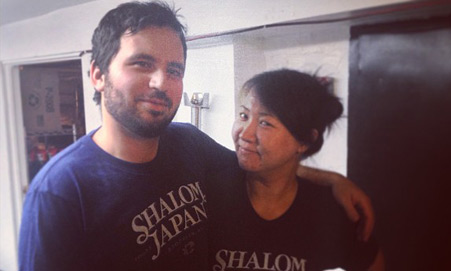I got a lot of raised eyebrows when I told friends the name of Williamsburg’s newest restaurant, Shalom Japan. “What, you mean like gefilte fish sushi?” one responded. Not exactly.
“It was really just me and Sawa sitting around and saying ‘We want to cook the food that we want to eat,’” Aaron Israel told me, explaining the genesis of the Jewish-Japanese fusion restaurant he and his wife and Sawako Okochi just opened. Both have impressive culinary resumes; Israel is an alum of Mile End Deli and Torrisi Italian Specialties, while Okochi worked at Annisa and The Good Fork. Together, they are Shalom Japan’s owners and co-chefs, with Israel bringing the Jewish perspective and Okochi bringing the Japanese perspective.
“It sort of grew out of us being together a lot,” Israel explained. The couple, who married in May, partially decided to open a restaurant together because they knew they likely wouldn’t see each other much otherwise, given their hectic work schedules at popular New York restaurants. “It was one or the other; either we’re all in, or I’ll fall into bed and you’ll wake up to go to work,” he continued. “So we said, ‘let’s just do it together.’”
The name is kitschy and playful—it’s inspired by a 1980s kosher Japanese nightclub in SoHo of the same name—but the food is serious. “We take what we do very seriously, but we don’t take ourselves very seriously,” Micaela Grossman, the restaurant’s general manager, told me. What Shalom Japan aims to offer is New American cuisine, without the distinct pretension that tends to be associated with such a title. Because really, what is ‘American’ food beyond a collection and conglomeration of foods from other cultures? The same, frankly, could be said of Jewish cuisine, in which recipes were influenced by the regions they were developed in. The fusion of Jewish and Japanese cooking, then, becomes a natural culinary development.
Israel and Okochi’s different backgrounds enable them to approach the other’s traditional food in a non-traditional way. This makes for items like Sake Kasu Challah with Raisin Butter; Chilled Udon Noodles with Beef, Beets, and Horseradish; a Lox Bowl with Rice, Daikon Radish, Avocado and Caviar; and Pastrami-Stuffed Chicken with Potato Salad and Mustard. I’ll let that sink in.
The creativity didn’t stop with the food. Grossman, along with head bartender Liam Baer, developed a cocktail menu that features traditional ingredients in unusual combinations, like the coyly named Oy Vei iz Kir, which features sparkling wine jazzed up with Manischewitz as one would use a kir liqueur—a dash of the oh-so (far-too?) sweet wine for a pinch of extra flavor. Shalom Japan’s bar also houses a variety of Eastern European and Japanese specialties, like wines from Hungary and specialty sakes.
The restaurant, nestled on the corner of South Fourth and Rodney Streets in Williamsburg, opened on August 1. It’s decorated with traditional Japanese noren (fabric dividers) bearing the restaurant’s logo—a merging Jewish Star of David and Japanese Rising Sun. A large chalkboard rests near the door, displaying the evening’s menu, which changes nightly depending on the chefs’ ideas for the evening. They’ll go to the farmer’s market in the morning, get inspired, then spend the day crafting recipes for that evening’s menu. The menu changes seasonally, too, a nod to restaurants in Japan, which offer different ingredients each season not so much as a culinary choice but instead based on what’s available locally.
The biggest challenge, Israel told me, was challenging people’s preconceived notions of what the two cuisines “are” or “should be.” “When people think of Jewish food, they think of a pastrami sandwich, and when they think of Japanese food, they think of sushi. But each of those cuisines are very complex in their history,” he explained. “If people come in and try the food, they’ll see some interesting ideas going on.”










I wish to show thanks to you just for rescuing me from this type of incident. Because of scouting throughout the world wide web and seeing concepts which were not powerful, I assumed my life was done. Being alive without the presence of approaches to the issues you’ve sorted out by means of this report is a serious case, and the ones which may have adversely affected my career if I hadn’t come across your blog. Your personal skills and kindness in maneuvering the whole thing was important. I don’t know what I would have done if I had not come across such a thing like this. I can also now relish my future. Thanks so much for your specialized and results-oriented guide. I won’t hesitate to refer your web page to any person who would need support about this subject matter.